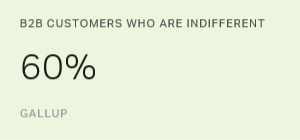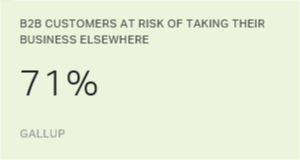Story Highlights
- Only 29% of B2B customers are engaged
- Indifferent customers are often among B2Bs' largest accounts
- B2Bs risk losing their indifferent customers to other companies
This article is the first in a two-part series.
Business-to-business (B2B) companies are placing greater emphasis on their customer relationships. They see them as a way to gain a competitive advantage, particularly in industries where products are commoditized and competition centers on price.
But despite the additional attention, customer relationships aren't improving. Gallup research shows that fewer than three in 10 customers (29%) across B2B industries are "fully engaged," meaning they are emotionally and psychologically attached to the B2B companies they do business with. The other customers are indifferent (60%), not caring about a company one way or the other, or they are actively disengaged (11%).
Far too often, indifferent customers include many of a B2B's largest and most tenured accounts. Leaders might assume those relationships are solid, but those customers may be more disconnected from their vendors than their vendors think. Indifferent customers are poised to take their business elsewhere.
Leaders Shouldn't Assume Relationships Are Solid
B2B leaders won't see this disconnect if they don't actively seek to understand their customers' point of view. Leaders can become comfortable when they have long-term contracts in place. They may postpone meaningful conversations with their customers, relying instead on safe or static measures to capture the "voice of the customer."
Leaders also might assume they'll hear about any burning customer problems from their account reps. But account reps may be unaware of problems, or they may choose to selectively filter information back to leaders, who then equate a lack of reported problems with customer engagement.
The problem? Indifferent customers are buying the function, not the brand.
Caring More About the Service Than the Provider
Indifferent customers usually have set criteria in mind for their purchasing decisions, such as price, quality or the size of the vendor organization or its geographic footprint. They may have a long history with a particular company and even enjoy working with people there, but may still be basing their vendor choice on the reality that the B2B in question meets their purchasing criteria.
Simply put, they care more about the product or service than the provider.
Perhaps this distinction shouldn't matter, as long as the B2B gets the business. But this type of relationship leaves a company vulnerable if or when an alternative vendor comes along that can meet those same criteria or can offer a better combination of product, service and price. Worse yet, Gallup's analysis of more than 200,000 relationships shows that indifferent customers are less likely to want to expand their business with their existing vendors or be an early adopter of new products or services those companies might offer.
Ultimately, weak customer relationships leave B2Bs vulnerable to losing their indifferent customers -- and the potential for growing those relationships -- to other companies, regardless of their account size or history.
The second article in this series discusses how to improve relationships with indifferent customers.


